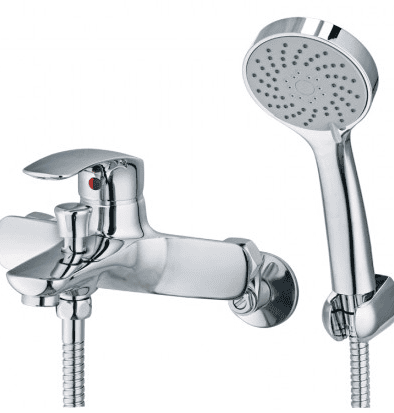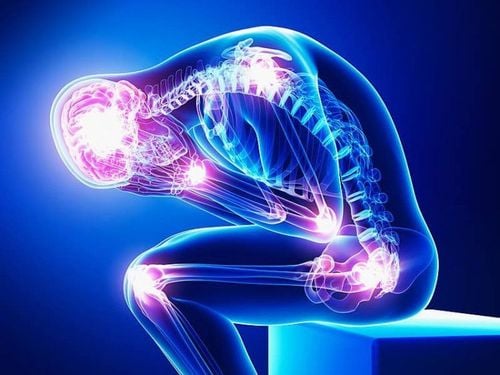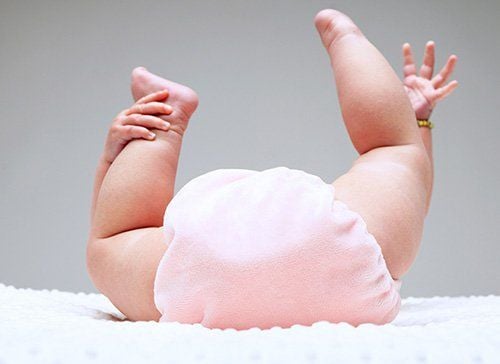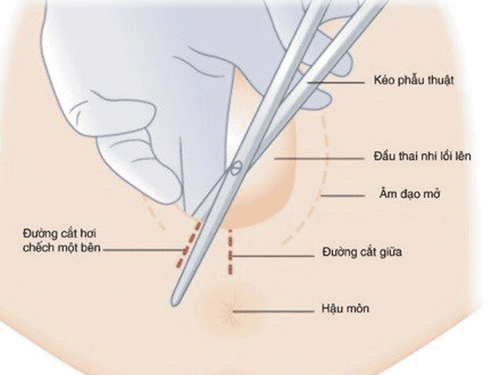This is an automatically translated article.
Article professionally approved by Master, Doctor Nguyen Thi An - Pediatrician - Neonatologist - Department of Pediatrics - Neonatology - Vinmec Ha Long International General HospitalPostpartum vaginal changes happen naturally, leaving you feeling wider, dry or sore for a while. Some women also tear, cut and sew up the perineum (the skin between the vagina and anus). However, you do not need to worry too much because now modern medicine has developed more, there are many ways to perform surgery and restore the vagina after giving birth.
1. Vagina is wider
Postpartum women's vaginas can often look wider than before, accompanied by bruising or swelling. You will also feel your vagina soften and looser, but this is completely normal.
Vaginal swelling and enlargement will start to subside a few days after the baby is born. Your vagina may not return to its full pre-pregnancy status, but this shouldn't be a big deal. If you feel worried, you can ask your doctor for more advice.
Medical experts always recommend postpartum mothers to perform pelvic floor exercises, also known as Kegel exercises, to help tone muscles and restore the vagina after childbirth. This exercise also works to prevent urine leakage (incontinence) and increase pleasure during sex.
Going through pregnancy and childbirth, the pelvic floor will be weak after giving birth. As a result, you may have difficulty holding your urine, especially when laughing or coughing, within 6 weeks of giving birth. Postpartum urinary incontinence is normal and lasts only a certain time. If you have a trauma, or a grade II tear or higher, you may experience urinary incontinence for up to 3 months postpartum. Women who do not have a tear or direct injury to the pelvic floor are "not allowed to pee in their pants" after 3 months.

Squeeze and contract the anus at the same time, and at the same time squeeze and pull the vagina upwards Contract quickly, tighten and relax the muscles continuously Then reduce the tempo slowly, squeeze and hold as long as possible before relaxing, but no more than 10 seconds. Repeat each beat 10 times, doing 4-6 times per day. Beginners can identify the pelvic floor muscles by imagining holding back a bowel movement, holding a tampon inside the vagina, or stopping the flow of urine. You can do this exercise while doing the laundry, queuing at the supermarket, or watching TV.
Trắc nghiệm: Bạn có hiểu đúng về dấu hiệu mang thai sớm?
Các dấu hiệu mang thai sớm không phải chỉ mỗi trễ kinh mà còn có rất nhiều dấu hiệu khác như xuất huyết âm đạo, ngực căng tức,… Điểm xem bạn biết được bao nhiêu dấu hiệu mang thai sớm thông qua bài trắc nghiệm này nhé!
2. Vaginal dryness
After childbirth, vaginal dryness is also common. The cause is related to lower levels of estrogen in the body compared to when you are pregnant.
Breastfeeding mothers have even lower estrogen levels, so dryness is also more evident. When you stop breastfeeding and get your period back on track, estrogen levels will return to pre-pregnancy levels, experts say. At this time, vaginal dryness will improve.
If you have started having sex again, but dryness prevents you from giving birth, you can use a lubricant bought at a pharmacy, supermarket or online from a reputable source. In case latex or polyisoprene condoms are used, be sure to choose a water-based lubricant. Oil-based products, such as moisturizers and lotions, can cause condoms to tear.
Instead of worrying alone, women should confide in their partners so that both of them can find a solution if their sex life after giving birth has problems and still cannot be stabilized. If vaginal changes after giving birth, specifically dryness, are affecting your life and you can't figure out how, talk to a specialist for support.

3. Stitch pain in the perineum
The vaginal area may feel sore or sore right after childbirth. The condition usually improves over the next 6-12 weeks. During this time, experts also recommend that women do pelvic floor exercises to help with postpartum vaginal recovery.
Your perineum may feel sore, especially if you need to stitch up a tear or cut during labor. Pain relievers are often helpful, but nursing mothers should consult their doctor or pharmacist before purchasing any over-the-counter pain relievers.
Keeping the perineal area clean is very important. Therefore, pregnant women should always:
Wash hands before and after changing tampons Make sure to change pads as soon as needed. Shower every day. While you wait for your episiotomy to heal, see your doctor if you have severe pain, discomfort, or notice an unusual odor. Although painful perineal swelling is common, persistent pain and discomfort should not be ignored after the wound has healed and you have resumed normal activities. Depending on the size of the wound, you may experience scarring as the tear or cut heals.

4. Pain during sex
There is no specific time to start having sex again after you give birth. However, both should not be too hasty. Everyone's experience is wildly different and it's important to be prepared. If the "love story" makes you feel pain, then it will no longer be fun and comfortable.
If your vagina is dry, try using a lubricant during intercourse to see if that helps. In case you have discomfort around the perineum, see your doctor to check that the wound is okay and is healing. In addition to hormone-related dryness, tearing and episiotomy can affect the comfort and recovery time of the vagina after childbirth, and scar tissue can also cause severe pain when impacted or pinched. Loose pelvic floor also reduces the chances of orgasm in women.
Postpartum women have less desire to have sex than before, it is also normal. New parents who are taking care of a baby feel very tired, even stressed and pressured. Instead of just silently suffering and avoiding sex, postpartum women should share it with their partner so that both of them can solve it together. If you continue to experience pain during sex, see your doctor to find out the cause.
Note, women can continue to get pregnant 3 weeks after giving birth, so don't forget to use birth control during sex.
Recommended videos:
In short, during a vaginal birth, the baby will pass through the cervix and out through the vagina. The pelvic organs are forced to stretch to their fullest extent to help the baby deliver, leading to weakness and injury. So it's not uncommon for women to experience vaginal changes after childbirth, becoming looser or drier than usual, accompanied by pain, especially during sex. All of these problems can and should be addressed by pelvic floor exercises, in close collaboration with a physical therapist.
Postpartum care is a continuous, comprehensive process for both mother and baby, including vaginal birth or cesarean section, women need recovery time to ensure that there are no postpartum complications.
At Vinmec International General Hospital, with a system of modern equipment and machinery, spacious and clean rooms, a team of experienced doctors and nurses will participate in the diagnosis and offer the most optimal method for each patient. depends on each woman. Thanks to that, it gives women absolute peace of mind, comfort, no worries for mother and baby. In addition, with an advanced and modern painless delivery method and a team of highly qualified professional anesthesiologists, expectant mothers will no longer have to endure strenuous pain, but instead, expectant mothers will have a A painless birthing experience at Vinmec is completely different.
Postpartum pain relief techniques to help women reduce pain at the episiotomy after giving birth, ensuring a quick recovery for women who give birth normally will be numbed by ultrasound machine ). For pregnant women who have had a caesarean section, they will be anesthetized by an ultrasound machine in the treatment of postoperative pain. The most recent results of analgesia evaluation showed that: All pregnant women who gave birth by caesarean section did not have to use morphine, and post-partum pain when moving and living was almost no longer recorded. In addition, mothers also have the opportunity to use screening services for babies before and after birth; storing cord blood, cord membrane... at Vinmec Institute of Stem Cells and Gene Technology - the world's most advanced and synchronous automatic storage and handling system.
Please dial HOTLINE for more information or register for an appointment HERE. Download MyVinmec app to make appointments faster and to manage your bookings easily.
References: healthline.com, .nhs.uk













